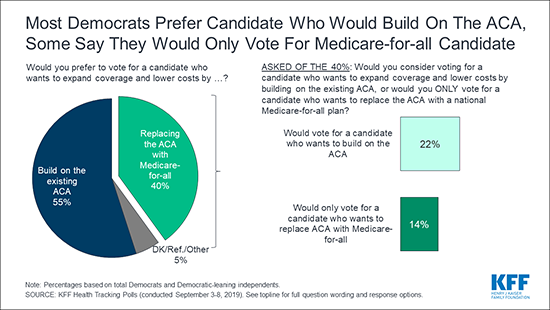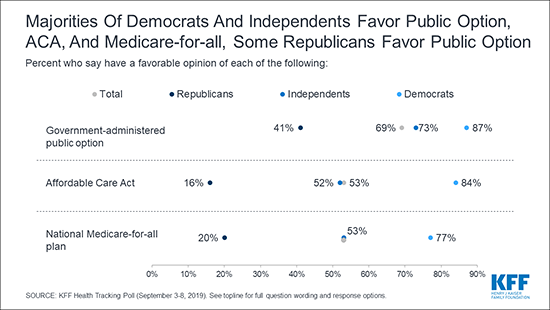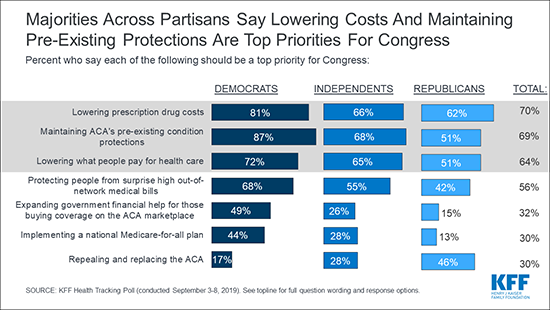Poll: Most Democrats Prefer a Presidential Candidate Who Wants to Build on the Affordable Care Act
53% of Public View the ACA Favorably as Democratic Support for the 2010 Law Reaches All-Time High
Poll Also Finds Strong Bipartisan Support for Surprise Billing Legislation
The latest KFF Health Tracking Poll probes Democrats’ views about the general approaches to expanding health coverage and lowering costs put forward by the candidates.
Most Democrats and Democratic-leaning independents (55%) say they prefer a candidate who would build on the Affordable Care Act to achieve those goals. Fewer (40%) prefer a candidate who would replace the ACA with a Medicare-for-all plan.

Even among those who prefer a candidate who would replace the ACA with a national Medicare-for-all plan, most say they would vote for a candidate who wants to build on the ACA (22% of all Democrats and Democratic-leaning independents). On the other hand, 14% of all Democrats and Democratic-leaning independents say they would only vote for a candidate who wants to replace the ACA with a Medicare-for-all plan.
Among the public overall, a majority (53%) now view the ACA favorably, a slight increase since July (48%) and up significantly since before President Trump took office. Among Democrats, 84% now view the 2010 law favorably – an all-time high in nine years of KFF polling. The share of Democrats who hold favorable views of the ACA has increased 11 percentage points during President Trump’s term, up from 73% in February 2017.
Opinions towards both a government-administered public option that would compete with private health insurance plans and a national Medicare-for-all plan in which all Americans would get their insurance from a single government plan hold steady this month, yet large shares express some uncertainty about the differences between the two proposals.
Nearly seven in 10 Americans (69%) favor having a government-administered public option and about half (53%) favor a Medicare-for-all plan. Most Democrats and independents favor the ACA, and the proposed public option and Medicare-for-all. Four in ten (41%) Republicans favor a government-administered public option.

The public is divided in their perceptions of the similarities between a national health plan in which all Americans would get their coverage from a single government plan and a government-administered public option that would compete with private health insurance.
About half (47%) say that the two approaches are “very” or “somewhat” similar. In spite of the debate about the approaches in Democratic presidential nominating race, Democrats are no more aware that the two approaches are different than the overall public is.
Large shares of the public say they have heard either “a little” or “nothing” about either a government-administered public option (64%) or a national Medicare-for-all plan (48%).
Out-of-Pocket Costs and Pre-Existing Conditions Are Public’s Top Health Priorities for Congress
With Congress back from its August recess, the new poll finds majorities across party lines consider action on lowering prescription drug costs (70%), maintaining the Affordable Care Act’s pre-existing condition protections (69%), and lowering the amount people pay for care (64%) as Congress’ “top” health-care priorities.

Congress is currently considering bi-partisan legislation to address surprise bills, which can occur when people with insurance inadvertently receive care from an out-of-network provider. The poll finds 78% of the public, and majorities of Democrats (84%), independents (78%), and Republicans (71%), support legislation to protect patients from paying the cost of such surprise bills.
A majority (57%) continue to support such legislation even after hearing opponents’ argument that it would lead to doctors and hospitals being paid less, though about one-fifth (17%) switch to oppose it after hearing the argument, increasing total opposition to 37%.
Designed and analyzed by public opinion researchers at KFF, the poll was conducted Sept. 3-8 among a nationally representative random digit dial telephone sample of 1,205 adults. Interviews were conducted in English and Spanish by landline (305) and cell phone (900). The margin of sampling error is plus or minus 3 percentage points for the full sample. For results based on subgroups, the margin of sampling error may be higher.

Filling the need for trusted information on national health issues, the Kaiser Family Foundation is a nonprofit organization based in San Francisco, California.
